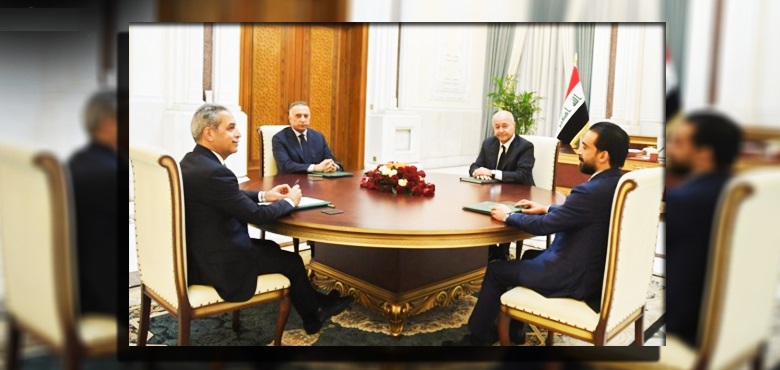AhlulBayt News Agency (ABNA): After the elections result released on October 10, Iraq's main issue has been the formation of the new cabinet and before it naming the prime minister, president, and the parliament speaker. Like in the past, it seems that replacing the old leaders with new ones remains the defining feature of the Iraqi politics.
This has been the trend for the three main power poles, namely the Shiites, Sunnis, and the Kurds. The Shiite Coordination Framework (SCF) made it clear that the current PM Mustafa al-Kadhimi has a slim chance of retaining the post. The Sunnis, who traditionally hold the speaker of the parliament post through an internal coalition, announced opposition to current speaker Mohammed al-Halbousi remaining in the post for another term. The Kurds, too, announced their opposition to Barham Salih remaining in the post of president.
Rasoul Radhi, a member of the State of Law coalition, said that the current leaders would not be given the posts again. Therefore, Iraq should expect new figures on whom intensive negotiations and speculations have already started.
Sadrist Movement's prominent figures for PM post
Although Shiite political parties have spoken out against the re-election of al-Kadhimi, in the event of a eruption of a crisis and disagreement over a new option, it is possible that he would be offered the post. But among the new options for the post of Prime Minister, a few important figures are worth mentioning.
Reports suggest that the leader of the Sadrist Movement, Muqtada al-Sadr, as the winner of the October election, plans to offer the post to former Iraqi Prime Minister Haider al-Abadi if the political factions fail to reach a consensus on the extension of al-Kadhimi term. Undoubtedly, the most important opponents of al-Abadi will be the Kurds and Sunnis since none of them are satisfied with his administration's management to finish ISIS terrorist organization.
In addition to al-Abadi, another option over whom the Shiites can reach a consensus is Nouri al-Maliki, the former prime minister and leader of the SCF. Of course, re-election of al-Maliki will be very difficult due to his differences with al-Sadr. The only way al-Maliki can once again take over the post of prime minister is accepting al-Sadr's special conditions, which, of course, seems highly unlikely.
Other options include Mohammad Shia Al-Sudani and Asad al-Aidani. Al-Sudani was born in 1970 in Baghdad and is the former governor of Maysan. He was minister of labor and social affairs under al-Abadi from 2014-2017. He also served as minister of commerce.
Asad al-Aidani, another option, served as minister of labor and social affairs, minister of industry, minister of trade, minister of human rights, and also mayor of Maysan. When the political circles discussed a replacement to PM Adel Abdel Mahdi, he was an option.
New names can be added to this list for PM post.
Options for holding the president post among the Kurds
For Kurds, there are other options than Barham Salih for the post of president. Although Salih can still be considered one of the main options, the Iraqi Kurdistan Democratic Party and some Shiite parties have strongly opposed him, which has reduced his chances for re-election. The Iraqi president post has traditionally been in the hands of the Patriotic Union of Kurdistan (PUK) since 2006 under Jalal Talabani. The party has offered alternatives to Saleh, the most important of whom are Adnan Mufti and Mullah Bakhtiari.
Adnan Mufti is a leader in the PUK and a former speaker of the Iraqi Kurdistan Regional parliament. Also, Hekmat Mohammad Karim, known as Mullah Bakhtiar, is the head of the political office of the PUK. In addition to these two options, the PUK is likely will nominate new candidates for the presidency.
But alongside the candidates of the PUK, the Kurdistan Democratic Party (KDP) will possibly try to take the president post from the rival PUK. It made such an effort in 2018 but failed. The current Foreign Minister Fuad Hussein, who was also the option for the KDP against Salih in 2018, is still one of the main challengers.
In addition to Fuad Hussein, the most important and prominent KDP choice can be Nechirvan Barzani, the current president of the Kurdistan Region. Nechirvan will no doubt have the best chance to take the president post if he decides to run, but his scanty fluency in speaking Arabic could be his biggest problem. Nechirvan is fluent in English, Persian, and Kurdish, but when it comes to Arabic, he can only understand but not to speak. This can pose the main obstacle for him to take the office in Baghdad.
Another KDP option is Hoshyar Zebari, a prominent politician who served as foreign minister and minister of finance. Moreover, the KDP has Rowsch Shaways, a senior leader, to name. Independent figures from Kurdistan region, like ex-lawmaker and member of Gorran Movement SardarAbdullah, can also be on the Kurdish table for president post.
Sunni choices for parliament speaker post
Like the Shiites and Kurds, the Sunnis are devoid of consensus over the current parliament speaker. The post is traditionally for them. They have seven options as replacements to al-Halbousi: Al-Anbar Governor Ali Farhan, former Education Minister Mohamad Tamim, Progress Coalition spokesman Yahya al-Mohammad, Agriculture Minister Falah Zaydan, Khaled al-Ubaidi, Thabet al-Abasi, and ex-parliament speaker Mahmoud al-Mashadani.
/129

